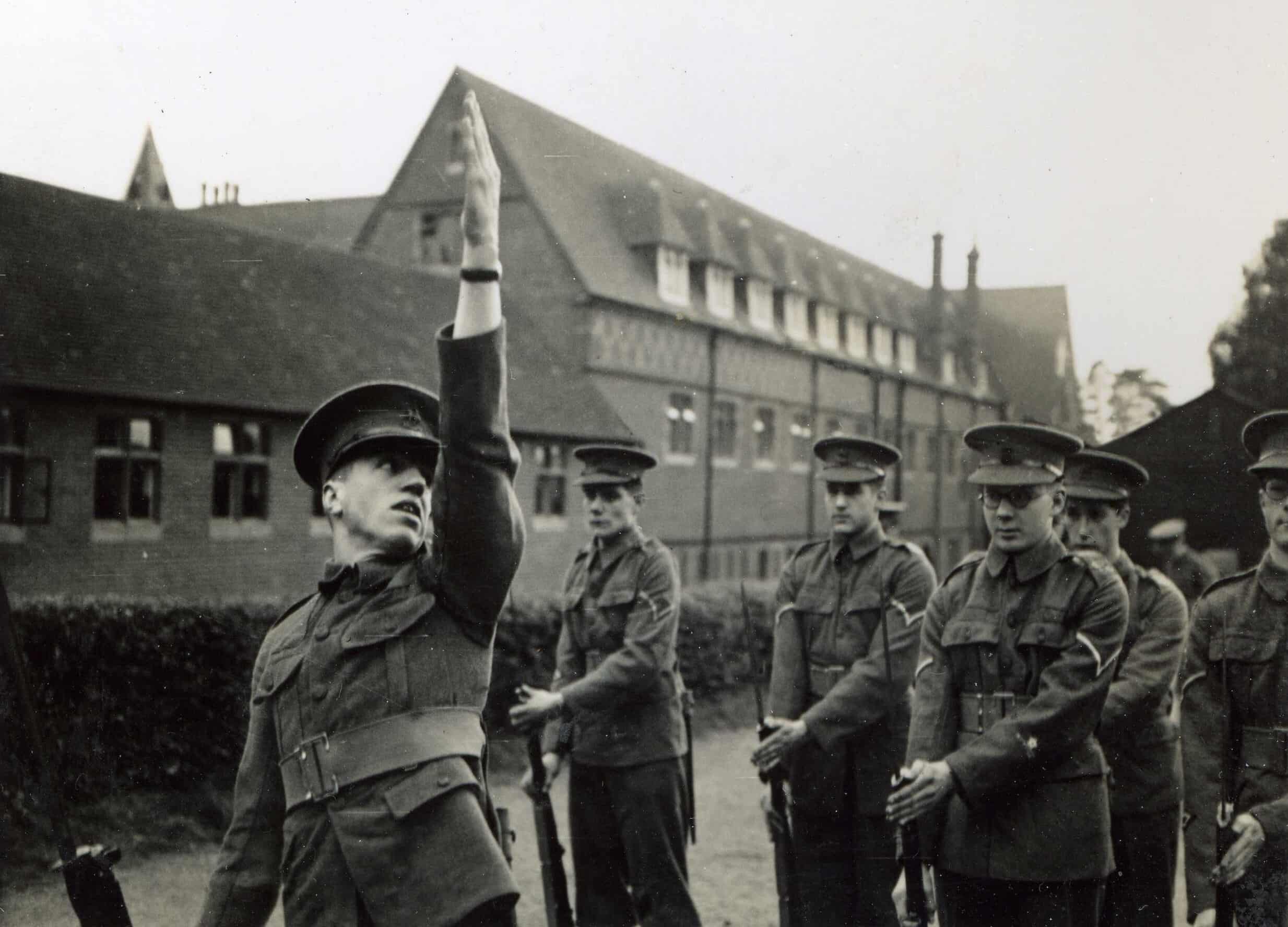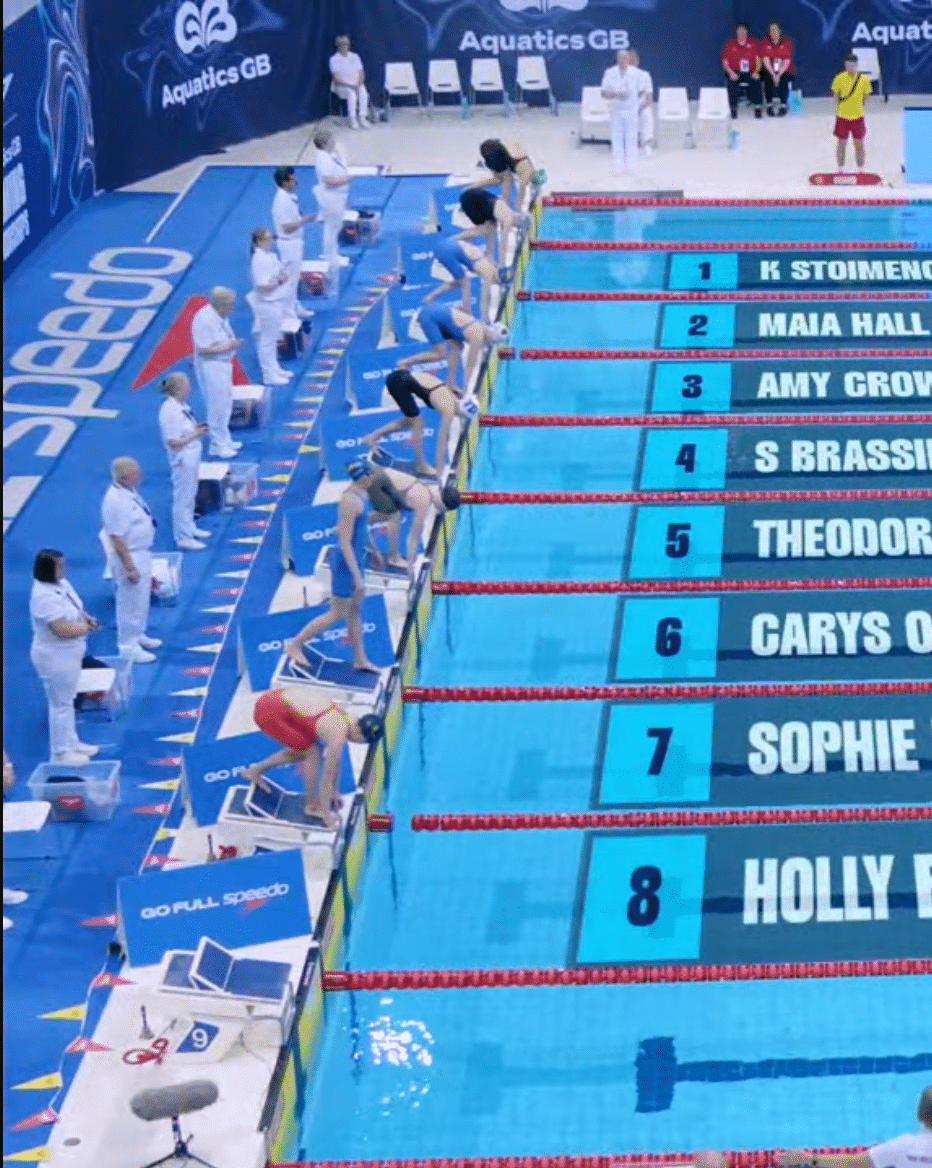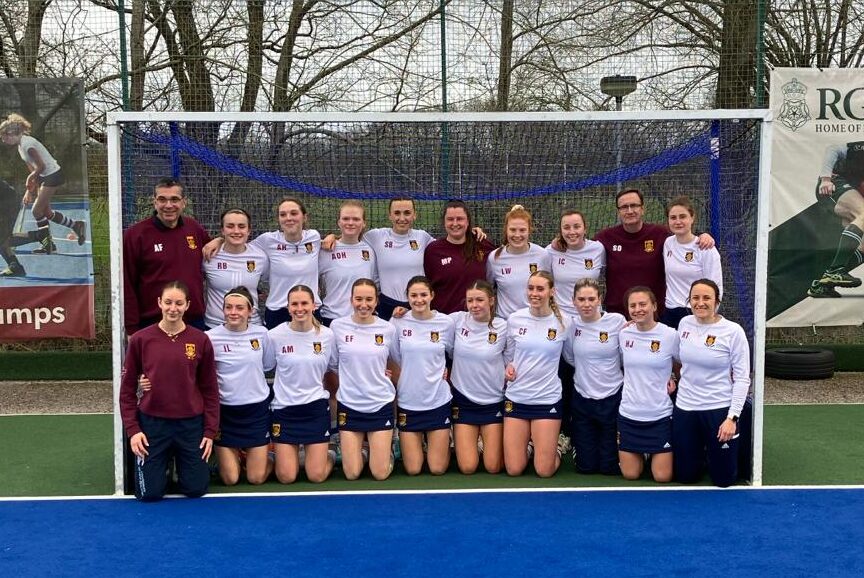East House share stories from their family members and relatives who have served in the military over the years.
Max C., House Captain
‘Dulce Et Decorum Est’ by Wilfred Owen is for me at the heart of each year’s Remembrance Service. The poem highlights the atrocities and futility of war, teaching us about the glorification of conflict by the state in WWI when in reality it was brutal and bloody. Wilfred Owen’s poetry tells us about the terrifying and incomprehensible atmosphere of fighting in the front lines, “In all my dreams before my helpless sight He plunges at me, guttering, choking, drowning.” The service that so many of our ancestors have made for us is unimaginable, as we sit in the comfort of our homes each day living life in peace. We remember the men who have died for our freedom in environments that no human dreams of when they enter the world. On Friday, 11th November, East men will take a vital and important moment out of our daily lives to remember all those who have fought and suffered for our nation in conflict. More importantly we will make sure that those like Wilfred Owen, who were sold a lie in WWI and died so that we could live in peace and harmony, remain never forgotten. We will remember them forever and ever.
Mr Pete Bradnock, Housemaster
 My Granny was a Land Girl in Devon and Dorset in the war. Her older brother Jack was in the Royal Navy and her younger brother Peter had joined the RAF as soon as he could, and aged 20 was given the keys to a shiny new Halifax bomber as pilot.
My Granny was a Land Girl in Devon and Dorset in the war. Her older brother Jack was in the Royal Navy and her younger brother Peter had joined the RAF as soon as he could, and aged 20 was given the keys to a shiny new Halifax bomber as pilot.
Their father, my great grandfather, one Humphrey-Wille Best, was a Commodore in the Royal Navy and had, amongst other escapades, scooped Karl Donitz out of the water in Malta when one of his HMS Snapdragon shells forced Donitz’s U-boat to surface in WW1. (Donitz went on to be Grand High Admiral of the Nazi fleet in WW2, and was left in charge of the Third Reich after Hitler had killed himself in 1945 – but I digress).
Peter was involved in sorties to Germany and the Ruhr specifically and after many successful raids was eventually hit. The Halifax he and his six crew were in turned into a fireball over Holland, and he managed to get all his crew out before parachuting desperately into the night before the plane exploded. He landed in a tree and had no knowledge of where he was at all. Disoriented, he tried swinging himself from side to side to locate a branch. Nothing. He dropped a compass to listen for the sound it would make on impact to gauge how high up he was. Nothing. He desperately needed to loo as well, and bracing himself for a pelvis-shattering fall to the ground beneath, he released the parachute straps and dropped 3 inches to the ground beneath.
The story gets darker here, as he was one of the captured pilots forced to march across Silesia (modern day Poland) going from camp to camp: he was in one of the Stalag Luft camps if I remember correctly – many died and it was only his youth and strength and hope that saved him. He had two unspeakably horrendous years of captivity, and when the war ended, he was shipped back to England weighing less than 5 stone (he was my sort of build), emaciated and more dead than alive.
However, survive he did and he ended up in Ireland for a time before settling just outside Newquay where he worked on his son’s fruit farm in Mitchell. He always kept a freezer full of meat just in case. I remember hearing that one day he came out of church (surprisingly perhaps, he wasn’t religious) and the vicar saying ‘You’re a very jolly sort of fellow aren’t you?’ and he replied ‘When you’ve been as close to death as I have, you tend not to take life too seriously’.
Olly S., Deputy House Captain
Heroic East men who served and lost their lives in WWI
Harry Kerle (East, 1911) joined the navy in 1914 but was discharged when it was found out he had been born in Germany to an Austrian father. He immediately enlisted in the London Scottish Regiment, and fell at Locre in 1918. For myself Harry embodies fighting for what is right, going against his country of birth to fight for his belief.
Harold Last (East, 1905) died in 1915 after being shot in the neck.
Edmund Tennant (East, 1900) was killed early in 1916, seven weeks after arriving in France; the same shell also killed his brother, and they are buried together.
Charles Bosher (East, 1901) and his cousin, Ronald, who had enlisted together, were also killed by the same shell in 1915
The last former-Cranleighan death directly resulting from the war came as late as 1973 when John Walker (East, 1913) died in a nursing home. Aged 19, he was shot in the head in Gallipoli in 1915 while serving with the Suffolk Regiment. He was brought home where he remained in a semi-vegetative state until his death. John fought on for 58 years after giving up the freedoms of his life just 2 years after leaving school.
Nick Heming (Father of Rory)
 My great uncle (Rory’s great great-uncle) Lieutenant Charles Leonard Parlett Heming was mortally wounded in WWI and died of his injuries aged just 19 years old. The link below gives an account of his short-lived life and tragically shorter career in the Army. However, there are interesting details of his injuries and subsequent evacuation from the front line. Likewise, there is a copy of his photograph which is pretty much the only picture we have of him.
My great uncle (Rory’s great great-uncle) Lieutenant Charles Leonard Parlett Heming was mortally wounded in WWI and died of his injuries aged just 19 years old. The link below gives an account of his short-lived life and tragically shorter career in the Army. However, there are interesting details of his injuries and subsequent evacuation from the front line. Likewise, there is a copy of his photograph which is pretty much the only picture we have of him.
http://www.hambo.org/kingscanterbury/view_man.php?id=176
I visited the grave last year and placed a wreath of poppies on it and I hope to take Rory down there over the coming weeks to show him.
Blaise Hammond (Father of Luca)
 A photo of Gabriel and Luca Hammond’s great grandfather, Captain Thomas Roffey Hammond. He was shot in the spine near Ypres going between two windows in a farmhouse. Being 6ft 7 he couldn’t get low enough. He was in the Lincolnshire Regiment. He’s the one in bed waiting with injured to return home.
A photo of Gabriel and Luca Hammond’s great grandfather, Captain Thomas Roffey Hammond. He was shot in the spine near Ypres going between two windows in a farmhouse. Being 6ft 7 he couldn’t get low enough. He was in the Lincolnshire Regiment. He’s the one in bed waiting with injured to return home.
Sara Al-Sayer (Mother of Laith and Omar)


Great grandma’s story. Bill Whiting married Elizabeth Topp, from Edinburgh, on 15th June 1940 in Wales where he was stationed. By August Bill was on a troop ship to Canada and Elizabeth was left behind as wives were not allowed to travel. So, Elizabeth decided to make her own way to Canada.
With help from her father, she found a berth on a Norwegian fishing boat leaving Liverpool in early December. It was part of a large convoy of ships taking families to the safety of US and Canada, plus some cargo but mostly going to bring back food to feed the British. She was the only passenger on this boat. The convoy set off late one night heading for the Irish Sea but by morning they found themselves alone! Almost the entire convoy had been torpedoed by German U-boats. This one little boat with only a dozen men on board – and one woman – carried on alone towards Greenland, hoping to avoid any wandering U-boats. Elizabeth’s job was to keep watch and man the sole Lewis Gun. The journey took three weeks amongst ice flows and icebergs but eventually they arrived in Halifax, Nova Scotia, where Elizabeth was able to send a telegram to her husband, who thought she was lost during the crossing. He took the train (24 hours) to meet her, and they were reunited.
James Boote (Father of Harry)
 Here is a newspaper article regarding Harry’s great great-grandfather Lieutenant-Colonel Charles Boote. He was a veteran of the Boer War (for which he was awarded the Freedom of the Borough of Stafford in 1901) and was battalion commander of the North Staffs 1st/6th Regiment on 1st July 1916 at the battle of the Somme. Of the 400 men he led over the top that morning on the Somme it is estimated that only 20 made it to the enemy line. His body was later recovered from no man’s land after the Germans had retreated back to the Hindenburg line. He’s buried nearby at Gommecourt Wood cemetery in France which we visited with Harry a few years ago.
Here is a newspaper article regarding Harry’s great great-grandfather Lieutenant-Colonel Charles Boote. He was a veteran of the Boer War (for which he was awarded the Freedom of the Borough of Stafford in 1901) and was battalion commander of the North Staffs 1st/6th Regiment on 1st July 1916 at the battle of the Somme. Of the 400 men he led over the top that morning on the Somme it is estimated that only 20 made it to the enemy line. His body was later recovered from no man’s land after the Germans had retreated back to the Hindenburg line. He’s buried nearby at Gommecourt Wood cemetery in France which we visited with Harry a few years ago.
Antonia Porter (mother of George and Henry)
Great great-uncle John Hubert Winton was 16 when he joined up in the First World War. He rose in rank quickly to 2nd Lieutenant but was killed at the Battle of the Somme 7th July 1916 aged 18 years old. 

Great grandfather Brigadier Ronald Boyd Winton was born in 1903. Was at Cranleigh from 1918 to 1921 in West with his cousin Walter Larcombe. He was mobilised at the outbreak of war and was posted to Palestine in 1940. He fought in the Middle East until 1944 without returning to the UK for leave. He served in Palestine, Iraq, Syria, Egypt and Trans-Jordan. He was mentioned in despatches in 1941 and was awarded the Defence Medal, the 1939-45 star, the Africa Star and the France and Germany Star. On return in 1944 he was appointed to the staff of the Supreme Headquarters Allied Expeditionary Force and spent the remainder of the war in France and Germany. In December 1944 he was invested with the OBE by the King. He died 28 June 1983.

 Grandfather Air Vice Marshall Tony Stables, was an officer commanding 18 Squadron Chinooks during the Falklands War. He was based and flew in the Falklands for five months during and after the war in 1982. Before he went to war, he was presented with a card from Cranleigh Prep School signed by all the pupils wishing him and his Squadron good luck. (The boy’s uncle, Jonathan Stables was at Cranleigh Prep). On return from the war he landed his Chinook on the Lowers and presented Cranleigh Prep with an Argentinian Pucara plane propeller. On his return he was awarded the Falkland’s medal and invested with the OBE by the Queen. He went on to serve in Germany, Northern Ireland and head up the KFOR peace keeping troops in Macedonia after the Kosovo war. He was invested with the CBE by the Queen in 1989 and retired from the Royal Air Force in 2001. He continues to support the services and was Chairman of the Headly Court Trust (where injured servicemen rehabilitated) until it’s closure and was integral in the planning, building and opening of the new veterans’ orthopaedic centre at Oswestry, Robert Jones and Agnes Hunt Orthopaedic Hospital.
Grandfather Air Vice Marshall Tony Stables, was an officer commanding 18 Squadron Chinooks during the Falklands War. He was based and flew in the Falklands for five months during and after the war in 1982. Before he went to war, he was presented with a card from Cranleigh Prep School signed by all the pupils wishing him and his Squadron good luck. (The boy’s uncle, Jonathan Stables was at Cranleigh Prep). On return from the war he landed his Chinook on the Lowers and presented Cranleigh Prep with an Argentinian Pucara plane propeller. On his return he was awarded the Falkland’s medal and invested with the OBE by the Queen. He went on to serve in Germany, Northern Ireland and head up the KFOR peace keeping troops in Macedonia after the Kosovo war. He was invested with the CBE by the Queen in 1989 and retired from the Royal Air Force in 2001. He continues to support the services and was Chairman of the Headly Court Trust (where injured servicemen rehabilitated) until it’s closure and was integral in the planning, building and opening of the new veterans’ orthopaedic centre at Oswestry, Robert Jones and Agnes Hunt Orthopaedic Hospital.
Jerry Biggs (Father of Benjy)
Benjy’s Grandfather, John Biggs, completed National Service a gunner in the Royal Artillery. During some long overdue R&R, he managed to get badly sunburned on his back and was taken to hospital for treatment. He was visited shortly after his arrival by his Platoon Sergeant, who he had presumed had come to reprimand him. Instead he was ordered to get out of his bed, pack his bag and report for duty at Mons Officer Cadet School to start officer training – a complete surprise! John completed 22 years of service before retiring at the rank of Major. He saw active service in the Far East and spent many years in Germany as part of BAOR (British Army of the Rhine). Despite his passion for sunbathing, John went on to win the Sword of Honour at Mons.
 I passed out of Sandhurst in 1993 and joined the Duke of Edinburgh’s Royal Regiment (now The Rifles). I immediately deployed on active duty to Bosnia Herzegovina as part of the United Nations peacekeeping mission. My Company (‘Gorazde Force’) were tasked with providing a protective shield around the besieged town of Gorazde. The fighting became pretty intensive and a number of soldiers were sadly killed and badly injured. The picture below shows a makeshift memorial that we put up for those that we lost. Apart from our own military personal the siege saw over 7,000 of the town’s residents killed including 548 children. Members of the Battalion continue to make regular visits to the town to pay respects to the local residents and ensure that our memorials are properly maintained. I went on to serve in Northern Ireland & the Middle East.
I passed out of Sandhurst in 1993 and joined the Duke of Edinburgh’s Royal Regiment (now The Rifles). I immediately deployed on active duty to Bosnia Herzegovina as part of the United Nations peacekeeping mission. My Company (‘Gorazde Force’) were tasked with providing a protective shield around the besieged town of Gorazde. The fighting became pretty intensive and a number of soldiers were sadly killed and badly injured. The picture below shows a makeshift memorial that we put up for those that we lost. Apart from our own military personal the siege saw over 7,000 of the town’s residents killed including 548 children. Members of the Battalion continue to make regular visits to the town to pay respects to the local residents and ensure that our memorials are properly maintained. I went on to serve in Northern Ireland & the Middle East.

Apologies for the poor photos but we didn’t have iPhones at the time and all of our personal cameras were stolen by the Serbians on our way in! A makeshift Remembrance Day Service – despite the conditions we still managed to pay our respects, even making an alter out of sandbags and getting locals to print out our orders of service!

I am pleased to say there are now permanent memorials as well. This one is for Pte Ben Hinton who was one of the youngest members of my Platoon. As an aside, the vicar on the left also used to be one of my soldiers and was badly injured in the same incident. As we put him onto a stretcher (and after a large amount of morphine) he said to me ‘Sir, sod being a soldier, I am going to be a vicar instead…it’s much safer!”
Kim Kilpatrick (Mother of Gus)
 Exercise Director Brigadier Peter Kilpatrick (Left), of the Australian Defence Force (ADF), and U.S. Marine Brigadier General Gordon Nash, Deputy Exercise Director, attend an amphibious assault at Freshwater Bay inside the Shoalwater Bay Training Area, Queensland, Australia, during exercise Crocodile, 1999. Brigadier Peter Kilpatrick served in the Australian Army for 33 years after being conscripted for the Vietnam War in 1968. After two years of Officer training at Australia’s Military College, Duntroon (Australia’s Sandhurst) in Canberra he served one tour of duty in Vietnam between 1970-71 as 2nd Lieutenant of the Royal Australian Artillery, 4th Regiment. After Vietnam he continued his Military career in the Australian army reaching the rank of Brigadier General.
Exercise Director Brigadier Peter Kilpatrick (Left), of the Australian Defence Force (ADF), and U.S. Marine Brigadier General Gordon Nash, Deputy Exercise Director, attend an amphibious assault at Freshwater Bay inside the Shoalwater Bay Training Area, Queensland, Australia, during exercise Crocodile, 1999. Brigadier Peter Kilpatrick served in the Australian Army for 33 years after being conscripted for the Vietnam War in 1968. After two years of Officer training at Australia’s Military College, Duntroon (Australia’s Sandhurst) in Canberra he served one tour of duty in Vietnam between 1970-71 as 2nd Lieutenant of the Royal Australian Artillery, 4th Regiment. After Vietnam he continued his Military career in the Australian army reaching the rank of Brigadier General.
We will remember them
Back to all news











